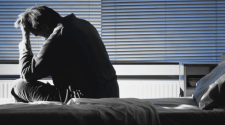Do You Have Sleep Anx iety?
If you worry a lot, you are more likely to suffer from sleep anxiety. Angst and stress can cause a sleepless night now and then. Yet, they can also have long-term effects on your health if the anxiety and lack of sleep continue over time.
Sleeping problems caused by anxiety can affect you for six months after you thought you stopped worrying and were on the road to feeling better. And if you're a chronic worrier, odds are you also have sleep issues.
Ongoing anxiety can cause a range of problems that inhibit healthy sleep. Stressful events such as death, divorce, or job loss, among others, can make matters worse.
If your inability to get restful sleep persists, those sleepless nights can lead to serious physical and emotional health problems, such as heart disease, diabetes, obesity, and depression.

What is a Sleep Disorder?
When you have a sleep disorder, you may have trouble falling asleep, staying asleep, or breathing during sleep, which can lead to poor sleep quality and health risks. Symptoms may include fatigue, daytime sleepiness, or other physical symptoms that interfere with daily life.
Insomnia, for example, is a sleep disorder characterized by an inability to fall asleep or to get enough sleep so that you feel rested. Another serious sleep disorder, sleep apnea, causes sufferers to repeatedly stop breathing during sleep, which can lead to dangerous health implications. If your lack of sleep (or too much sleep) interferes with your daily routine and/or your wellness, you may have a sleep disorder.
What is Anxiety Disorder?
Anxiety is that feeling we all have when we are nervous, worried, or tense because of events and circumstances in our lives. If those feelings become pervasive and you worry so much that you are concerned about every day happenings, then you may have an anxiety disorder. About 40 million Americans suffer from some kind of anxiety disorder.
Some anxiety is normal. For instance, it is okay to feel nervous before you stand in front of an audience and give a speech. It is not normal to flee the building because you are afraid.Some people may develop sleep anxiety because they are worried about not sleeping.
Treatment Options
If anxiety is affecting your sleep, then both areas likely will need treatment because it is possible one can cause the other. Lack of sleep can lead to anxiety, and anxiety can lead to lack of sleep.
A physician can treat sleep anxiety with medication or a counselor can help you with talk therapy. Relaxation techniques, such as meditation or biofeedback, may also be helpful.
If your physician suspects a sleep disorder, he or she may ask you to keep a sleep journal to record your waking and sleeping hours and how you feel.
Then you may need to have a sleep study where you spend the night at a sleep center and will be monitored for issues such as sleep apnea, restless leg syndrome, or other problems.
Tips for Better Sleep
To reduce sleep anxiety and obtain a good night's rest, try the following:
- Exercise in the mornings or afternoon and not prior to bedtime. Consider yoga, Tai Chi, or similar activities.
- Meditate by focusing solely on your breathing. An easy method is to count each inhalation and exhalation up to 10, then start over again, until you feel calm.
- Establish a regular bedtime routine. Go to bed at the same time each night, and do not watch violent TV or engage in physical exertion prior to bedtime. Instead, listen to music, read, or engage in quiet conversation.
Always check with your doctor prior to engaging in vigorous exercise or in other lifestyle changes. If you continue to feel fatigued, sleep-deprived, or anxious, see your physician right away.
Related Information - Sleep Anxiety
Symptoms of Insomnia
Benefits of Sleep
Physcial Effects of Stress
Share Sleep Tips Do you have a great tip to share with others who are struggling with sleep? What works for you might help someone else. |



